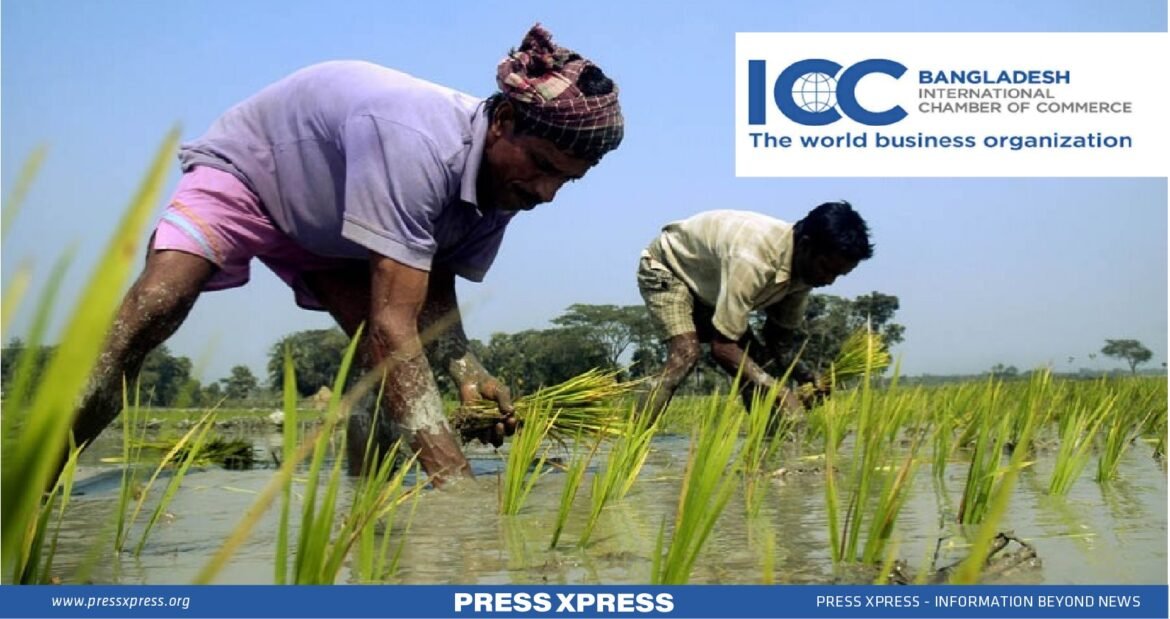The adoption of climate-smart agricultural practices is crucial for improving smallholder farmers’ capacity to adapt to climate change and achieve the United Nations Sustainable Development Goals (SDGs).
Currently, Bangladesh is diligently directing its endeavors toward fortifying nutritional security and enhancing its potential for food exports. The indisputable truth of climate change looms large, casting a formidable shadow over global agricultural productivity. According to the International Chamber of Commerce-Bangladesh (ICCB), climate change has instigated heightened volatility in crop production, unsettling the global food supply chain and causing concerns about food and nutritional stability. This volatility, particularly prevalent in nations like Bangladesh, assumes added significance given the pivotal role of agriculture in the country’s economy.
Implementing Climate-Smart Agriculture for Sustainability
Promoting climate-smart agricultural practices in Bangladesh is crucial to building resilience among smallholder farmers, adapting to climate change, and contributing to achieving the United Nations Sustainable Development Goals. In Bangladesh, agriculture accounts for 11.50% of the GDP and employs 41% of the population, directly or indirectly. However, agricultural productivity in Bangladesh remains lower than in neighboring South Asian countries.
The vulnerability of Bangladesh to climate change is exacerbated by factors such as high population density, poverty, and a heavy reliance on climate-sensitive sectors. A study by Standard Chartered Bank identifies Bangladesh as one of the countries requiring substantial adaptation investments to address climate change risks. By investing $1.2 billion in adaptation by 2030, Bangladesh could prevent projected damages and lost GDP growth of $11.6 billion, providing substantial returns. In contrast, without a minimum investment of $30 billion, Bangladesh and other vulnerable markets are projected to face damages and lost GDP growth of $377 billion.

Imperative of Sustainable Agriculture for Global Food Security
Agriculture is not only a victim of climate change but also a significant contributor to it, primarily through greenhouse gas emissions. Furthermore, agriculture is highly sensitive to temperature changes and extreme weather events. Even a limited temperature rises of 1.5°C can have a substantial impact on crop yields and food production.
The World Bank reports that 690 million people are currently hungry, and the challenge of feeding an estimated 9 billion people by 2050 is becoming increasingly difficult, especially in the face of climate change. In Asia and the Pacific, climate change is affecting agriculture and food production significantly, posing a severe threat to food security and the achievement of Sustainable Development Goals.
To mitigate these challenges, it is essential to improve food system sustainability by adopting sustainable agricultural practices, promoting sustainable diets, and reducing greenhouse gas emissions across the entire food supply chain.
Moreover, climate change is disproportionately affecting the most vulnerable countries and people by affecting livelihoods and income in rural areas, as well as impacting marine, coastal, terrestrial, and inland ecosystems.
The negative impacts of climate change, including increasing temperatures, weather variability, shifting agro-ecosystem boundaries, invasive crops and pests, and more frequent extreme weather events, are already being felt. To secure global food security, countries like Bangladesh must take proactive measures to adapt to climate change and reduce their contributions to it, while also ensuring the sustainability of their agriculture sectors.
Climate Change and its Impact on Agriculture
Climate change poses a significant threat to global food security, and the effects are being acutely felt in Bangladesh, a country that is highly susceptible to the ravages of a changing climate. A recent editorial from the International Chamber of Commerce-Bangladesh (ICCB) underscores the importance of adopting climate-smart agricultural practices to mitigate the impact of climate change on the nation’s agricultural sector. The ICCB’s message is clear: the adoption of climate-smart agricultural practices is crucial for improving smallholder farmers’ capacity to adapt to climate change and achieve the United Nations Sustainable Development Goals (SDGs).
Urgent Need for Sustainable Agriculture
To address the growing challenge of climate change and its effects on agriculture, a shift towards sustainable agricultural systems is imperative. Sustainable practices can help reduce greenhouse gas emissions throughout the food production supply chain while ensuring food security and resilience for vulnerable communities. Sustainable diets and reducing waste are equally critical components of this transition.
For Bangladesh, the ICCB emphasizes the urgency of investing in climate-smart agriculture, as the nation’s changing climate conditions threaten annual GDP losses in the range of 1 to 2 percent. By embracing sustainable agricultural practices, Bangladesh can fortify its agricultural sector, empower its farmers, and ensure food security in the face of an increasingly unpredictable climate.

Bangladesh’s Role in Climate Mitigation
While Bangladesh contributes only 0.4 percent of global greenhouse gas emissions, the nation is ranked high on the list of countries most vulnerable to climate change. Its unique set of challenges, including poverty, high population density, and reliance on climate-sensitive sectors for water and food security, necessitate a proactive approach to climate adaptation.
A recent study by Standard Chartered Bank highlights the critical need for adaptation investment in Bangladesh. This investment, alongside action in other high-impact markets such as China, Egypt, India, Indonesia, Kenya, Nigeria, Pakistan, the UAE, and Vietnam, could prevent projected damages and lost GDP growth of USD11.6 billion in Bangladesh alone, nearly ten times the investment amount.
Without a minimum investment of USD30 billion across the ten featured markets, the study estimates projected damages and lost GDP growth of USD377 billion. This emphasizes the dire need for immediate action to address climate change and protect the livelihoods and food security of millions of people worldwide.
Promoting the adoption of climate-smart agricultural practices in Bangladesh is not just an economic or environmental necessity; it is a matter of survival. As climate change continues to disrupt global food systems and push millions into hunger, Bangladesh stands as a microcosm of the larger global struggle for food security in a warming world. By embracing sustainable agriculture and making strategic investments, Bangladesh can lead the way in achieving a more resilient and sustainable future for its people, while contributing to the global fight against climate change.


